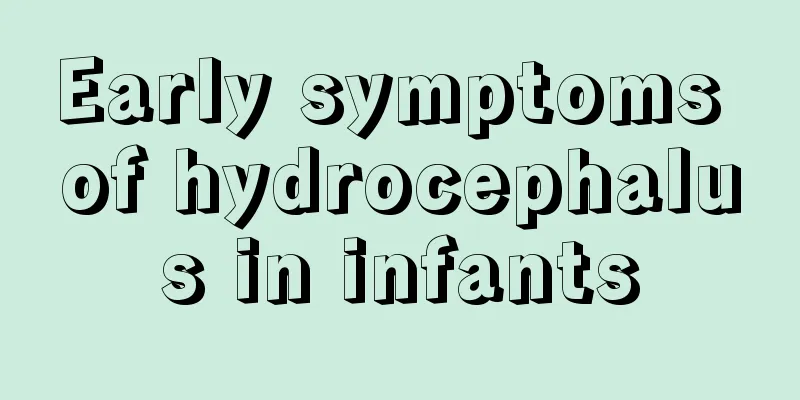Early symptoms of hydrocephalus in infants

|
Extracerebral hydrocephalus in infants mainly refers to the increase of cerebrospinal fluid, which will cause the expansion of the subarachnoid space, which is quite harmful to the child. In particular, the head circumference progressively increases, because the fontanelle has not completely closed at this time, and fontanelle dilation is prone to occur. Generally speaking, this situation can be treated surgically. If the symptoms are mild, conservative methods can be used for treatment. Early symptoms of hydrocephalus in infants The most important sign of hydrocephalus in infants is the progressive increase in head circumference. At this time, because the cranial sutures have not closed, the fontanelles are enlarged, the tension is high, and the cranial sutures are split. Due to high intracranial pressure, venous return is obstructed and the scalp veins are dilated. When percussing the child's head, there is often a hollow feeling and a low sound, so it is called a broken pot sound (McEwen's sign). The eyeballs rotate downward and often fall below the lower eyelid, which is called the setting sun sign. The above are specific signs of hydrocephalus in infants. The diagnosis of hydrocephalus in infants is generally not difficult based on their clinical manifestations, rapid growth of the head and their unique morphology. Treatment principles: Surgery is the main treatment. Conservative treatment is suitable for patients with mild and stable symptoms, and can also be used as an adjuvant treatment after surgical treatment. Surgical treatment can be divided into three categories: 1. Surgery to eliminate the cause of the disease: Aqueduct stenosis can be treated with dilation or catheterization. If adhesion occurs at the median foramen, adhesion lysis and incision and shaping can be performed. For foramen magnum deformity, suboccipital and high cervical decompression can be performed. Tumor compression can be treated by tumor resection, etc. 2. Cerebrospinal fluid shunt: There are two types of shunts: intracranial shunts and extracranial shunts. The latter is particularly suitable for communicating and normal intracranial pressure hydrocephalus. This operation requires special tubing with a pump, and domestically produced shunt tubes are now available. 3. Surgery to reduce cerebrospinal fluid production: Mainly for choroid plexus resection or electrocautery surgery in the trigone of the lateral ventricle. This procedure is rarely used now that new insights into the cause of hydrocephalus have emerged (mainly malabsorption rather than excessive secretion). The purpose of drug treatment is to temporarily reduce the secretion of cerebrospinal fluid and increase the excretion of water in the body. It has little effect when used alone. |
<<: Children's allergic symptoms of taking ceftriaxone
>>: What are the symptoms of baby fever
Recommend
Why can't children eat scallops?
For adults, eating some scallops properly is very...
What should I do if my child gets prickly heat?
Children often get prickly heat in the summer, es...
How much milk does a five-month-old baby usually drink?
The baby's health has become the biggest conc...
Why do children often sweat on their backs?
Parents with babies at home will definitely find ...
Causes of urticaria in children
Although there are many types of diet nowadays, t...
What are the antibiotics for children?
There are quite a variety of antibiotics for chil...
What is the reason for children's yellow urine
Many people may ignore the color of their urine a...
What are the hazards of smog to children?
Haze is quite harmful to children, because their ...
Baby indigestion constipation
Regarding babies, there are always various diseas...
How to reduce children's fever
Children's fever is a problem that many paren...
What to do when red spots appear on the child's body
I believe everyone knows the importance of skin t...
How tall is a 16 month old baby?
After a child is born, many issues concern adults...
Why does the child cough while sleeping?
When a child is sick, parents will go to the pedi...
What should I do if my child’s deciduous teeth are broken?
Baby teeth have many functions for children. For ...
Can't take calcium tablets if you have enlarged lateral ventricles
Ventriculomegaly is a fetal disease that can be d...









